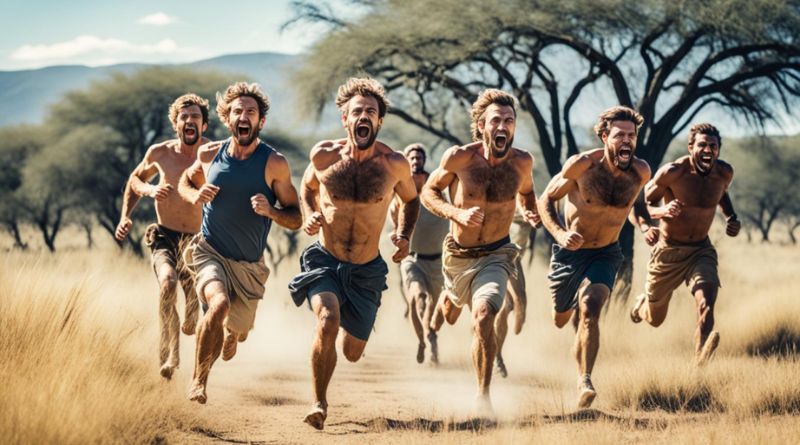Running is one of the most fundamental and instinctive activities known to humankind, making it challenging to pinpoint an exact date or moment of its “invention.” Instead, running has evolved alongside humans, deeply intertwined with our survival and development as a species. This article explores the origins of running, its evolution, and its significance throughout history.
Table of Contents
The Origins of Running
Evolutionary Background
Running is believed to have originated with our early human ancestors. Homo erectus, who lived approximately 1.9 million years ago, exhibited anatomical features that suggested an ability to run efficiently. These include long legs and a relatively narrow pelvis, which are conducive to bipedal locomotion.
Our ancestors relied on running not only for hunting and gathering but also for escaping predators. The development of sweat glands enabled early humans to run long distances without overheating, a crucial adaptation for endurance hunting. This ability to run and chase prey likely gave early humans a significant advantage, influencing their survival and the eventual spread of our species.
Cultural Significance in Ancient Societies
Running has always held cultural significance in various societies. In ancient civilizations, it was more than just a means of transport or hunting; it became a symbol of physical prowess and competitive spirit. The ancient Greeks are particularly notable for their contributions to the development of running as a sport.
The Olympic Games, established in 776 B.C., featured running events such as the stadion (a short sprint) and the diaulos (a double-stadion race). These competitions celebrated athleticism and inspired a culture of fitness that persisted through centuries.
The Development of Running as a Sport
Ancient to Modern Times
While running was practiced in various forms in ancient civilizations, the modern era of running as a competitive sport began in the 19th century. This period saw the establishment of organized races, track and field clubs, and a growing emphasis on athletic competition.
The first modern Olympic Games were held in Athens in 1896, featuring the marathon as a key event. This race, which symbolizes endurance and perseverance, was inspired by the legendary run of Pheidippides, who ran from Marathon to Athens to announce a military victory in 490 B.C.
The Rise of Competitive Running
As the 20th century progressed, running gained popularity as a recreational and competitive sport. The introduction of running events, such as marathons, sprints, and ultra-marathons, made it accessible to people of all ages and abilities. Notable marathons, like the Boston Marathon established in 1897, became prestigious events, drawing athletes from around the world.
Today, running is a global phenomenon. With countless local races, organized fun runs, and running clubs, it has become a staple in communities, encouraging fitness and camaraderie.
The Health Benefits of Running
Running offers numerous health benefits, contributing to its popularity. Regular running can:
- Improve Cardiovascular Health: It strengthens the heart, reduces blood pressure, and improves overall circulation.
- Aid Weight Management: Running helps burn calories, contributing to weight loss and maintenance.
- Enhance Mental Well-being: It releases endorphins, which can alleviate stress and improve mood.
- Build Stronger Muscles and Bones: Running helps strengthen lower body muscles and improve bone density.
FAQs About Running
1. When did humans start running?
Running likely began with early human ancestors over two million years ago as a fundamental survival skill, although it evolved into a sport later in ancient civilizations, particularly in Greece.
2. What is the history of the marathon?
The marathon originated from the story of Pheidippides, who ran from the battlefield of Marathon to Athens in 490 B.C. The modern marathon was first introduced in the 1896 Olympic Games.
3. Why is running considered a natural form of exercise?
Running is a basic human movement requiring minimal equipment and can be done in various environments. It engages multiple muscle groups and provides a comprehensive workout.
4. What are the health benefits of running?
Running can enhance cardiovascular health, assist in weight management, improve mental health, and strengthen muscles and bones.
5. How has running evolved as a sport?
Running transitioned from a survival skill to an organized sport in the 19th century, with various events and competitions emerging. Today, it includes marathons, sprints, and fun runs for all fitness levels.
6. Can anyone start running?
Yes! Running can be adapted to suit individuals of all fitness levels. Beginners are often encouraged to start with walking or a combination of walking and running before gradually increasing their pace and distance.
Conclusion
While running may not have a specific date of “invention,” it has been an integral part of human existence for millions of years. From its evolutionary origins to its development as a global sport, running has significantly influenced our culture, health, and well-being. Whether for competition, fitness, or leisure, running continues to be a vital activity that connects us to our past and enriches our lives today.
